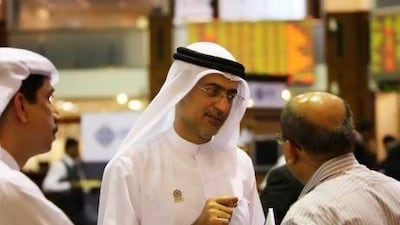It was all in a normal day's work for Mohammed Sharaf, the chief executive of DP World (DPW), at the Dubai Financial Market on Monday.
He was booked to give a presentation to investors about the company that he has run since 2005. He must have put on this show hundreds of times around the world to international investors, and was so on top of his subject he barely needed the PowerPoint prompts to tell the success story of DPW.
On the other hand, there was something unique about the occasion. It was the first in a series of "company focus" weeks organised by the DFM to highlight the attractions of Dubai's quoted companies.
"I'm honoured DPW has been asked to launch this initiative," says Mr Sharaf. But really, if you wanted an exemplar of Dubai's corporate success, where else would you start except with DPW?
As Mr Sharaf recognised, the group is at the heart of the Dubai economy. "Everything you buy in Dubai Mall or Mall of the Emirates is taken off a ship at Jebel Ali [DPW's headquarters and flagship port in Dubai]. "It is the backbone, the lifeline of the economy," he says.
DPW is also, along with Emirates Airline, perhaps the best known Dubai corporate brand internationally, operating 60 terminals across six continents. Its takeover of the P&O ports business in 2006 put Dubai on the map with the biggest deal in the emirate's corporate history.
Mr Sharaf has been with the company all the way. After studying at the University of Arizona, he began his career in shipping at the Holland Hook terminal at the Port of New York/New Jersey, but returned to the UAE in 1992 to join the Dubai Ports Authority.
There, he eventually became the managing director and oversaw the development of Port Rashid and Jebel Ali and before heading up Dubai Ports International, the forerunner of DP World, which was formed in 2005.
So when he gives a snapshot of DPW's global business today, he knows what he is talking about. The audience of investors, brokers and financiers on the floor of the DFM are taken through the state of the company today.
"DP World is focused on faster growing emerging markets in an industry with high barriers to entry, and it has historically grown faster than the industry, which itself grows faster than GDP growth," he explains.
The container industry has historically grown at three to four times faster than average GDP growth, and DPW has expanded at around 1.5 times that rate, (except for the recession-ravaged year of 2009), giving it premium growth rates across the emerging world, from which it derives 85 per cent of its business.
More than 70 per cent of DPW cargo is what is described in the business as "origin and destination" - meaning the goods shipped are for final use in the country of destination - which is higher value added than the re-export business.
Some 40 per cent of DPW business is in its Middle East heartland, but this compares favourably with the international competition.
Hutchison Ports, based in Hong Kong, derives 56 per cent of its business from eastern Asia, while the Port of Singapore is more heavily dependent on the region, at 78 per cent.
Mr Sharaf gets close to animated when he goes on to talk about expansion plans. New terminals are planned in Peru, Brazil and even Egypt ("it will take time but people will get back to normal life there").
He is most excited, however, about the plans for London Gateway, the US$2.5 billion (Dh9.18bn) development to the east of Britain's capital. "This will be our second major port in the world. The British economy might be poor, but the London economy is different, and is still booming," he says.
The plans for Jebel Ali are also ambitious, aiming to push the total capacity from 14 million twenty-foot equivalent units (TEUs, the industry's standard measure of volume) to 19 million by next year. "More containers go through Jebel Ali than go through the whole of India," says Mr Sharaf proudly.
As potential or actual investors, the audience at the DFM is keen to hear details about the financials. "We have a strong balance sheet, well positioned to finance the expansion of the portfolio, and return on capital employed has doubled since 2009," he says.
With some input from Yuvraj Narayan, the chief financial officer, he fields some routine investor complaints, about dividends, bonus issues and currency exposures, before facing the issue that, despite commercial and financial success, has become DPW's albatross: the share price.
The company was listed at $1.30 in late 2007 just before the financial crisis sent equity markets into a downward spiral. Today, they still trade well below the IPO level.
"We were lucky five years ago when we listed, we've been unlucky since. But we take a long term view and what goes round comes round," Mr Sharaf says.

